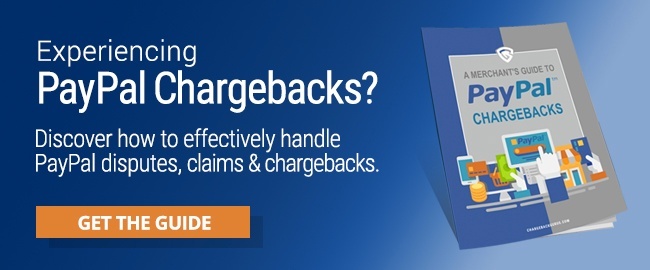Avoid PayPal Disputes, Claims & Chargebacks - Solved
PayPal has many fans in the online business community. Without PayPal, many merchants would struggle to find an affordable, easy-to-use platform for accepting payments over the internet. PayPal also offers its merchants a good deal of protection and security, but PayPal is not invulnerable to scams and transaction disputes, and even payments made over PayPal are subject to chargebacks.
 Transaction disputes can be extremely costly for merchants. Whenever a bank or payment processing platform gets involved, they start charging fees that can quickly add up to almost double the amount of the original transaction. It’s better to give a customer a refund than let a dispute escalate, it’s better to fight a claim or chargeback than roll over and accept it as the cost of doing business, and the best thing of all is to implement practices and policies that reduce the number of disputes that happen in the first place.
Transaction disputes can be extremely costly for merchants. Whenever a bank or payment processing platform gets involved, they start charging fees that can quickly add up to almost double the amount of the original transaction. It’s better to give a customer a refund than let a dispute escalate, it’s better to fight a claim or chargeback than roll over and accept it as the cost of doing business, and the best thing of all is to implement practices and policies that reduce the number of disputes that happen in the first place.
When it comes to fighting and avoiding transaction issues, knowledge is power. The first thing PayPal sellers should familiarize themselves with are the several types of transaction issues they might encounter.
PayPal Transaction Issues
Disputes
For buyers, the first step in disputing a transaction is to make a complaint to the PayPal Resolution Center. The seller will be notified about the buyer’s complaint and is given 20 days to give the buyer a refund or find some other way to resolve the dispute. If they don’t come to an agreement, the buyer can escalate the dispute, and it becomes a claim.
Claims
When a dispute is escalated to claim status, PayPal steps in. They will contact both parties, gather and review information, investigate the case, and make a final determination as to whether the merchant gets to keep the funds or not.
Bank Claims
Buyers always have the right to take their transaction issues up with their banks, but because PayPal serves as a middleman facilitating the transaction, they will still be involved in disputes that are initiated outside the PayPal Resolution Center. Buyers can make bank claims on payments made with debit cards and bank accounts. The funds will then be withdrawn from the seller’s account, and they will have to provide PayPal with compelling evidence in order to fight the claim and have it reversed in their favor.
Chargebacks
 Even on PayPal, chargebacks can still get you. When a buyer makes a payment with a credit card, they have 120 days to request a chargeback from their issuing bank. If the seller wants to fight the chargeback, they have to submit compelling evidence that shows why the transaction should be upheld. Documentation is submitted to PayPal via the Resolution Center, who passes it along to the issuing bank so they can make a decision on the case. The bank then notifies PayPal of their decision, and PayPal notifies the seller.
Even on PayPal, chargebacks can still get you. When a buyer makes a payment with a credit card, they have 120 days to request a chargeback from their issuing bank. If the seller wants to fight the chargeback, they have to submit compelling evidence that shows why the transaction should be upheld. Documentation is submitted to PayPal via the Resolution Center, who passes it along to the issuing bank so they can make a decision on the case. The bank then notifies PayPal of their decision, and PayPal notifies the seller.
Paypal's 5 Best Chargeback Prevention Practices
Many disputes arise due to disagreements or miscommunications between the buyer and seller that could have been avoided with better customer service, clearer communications, or more careful record-keeping.
We have found these five habits to be highly effective at eliminating the confusion and conflicts that lead to disputes and chargebacks:
- Set realistic expectations with your customers about what your products can do, how fast you can ship them, and what they can expect in terms of refunds and ongoing assistance.
- Do everything you can do to avoid delays in shipments or service. If delays cannot be avoided, contact your buyer and let them know exactly what is going on and when they can expect to receive their product or service. This is especially important during the holidays!
- If something goes wrong and you cannot fulfill an order, give the buyer a refund immediately.
- If you deliver a product or service and a dispute is raised, try to figure out what went wrong, why the buyer is unhappy, and what you can do to resolve the issue with them. Prompt, clear, and honest communication can go a long way.
- Have a service agreement in place that outlines deliverables and acknowledges when services have been rendered. When it’s easy for buyers to understand your terms, conditions, and policies, there’s less chance of confusion and frustration.
It’s not possible to avoid every dispute or problem that might come up, but better business practices and excellent customer service can make a huge difference. Don’t let problems fester until your customers throw up their hands and complain to PayPal—be proactive about resolving their issues and working with them to create satisfactory outcomes.
Businesses that process e-commerce and other card-not-present transactions—including the over 17 million who use PayPal for payments—are quickly learning about the risks and realities of chargebacks.
Thanks for following the Chargeback Gurus blog. Feel free to submit topic suggestions, questions or requests for advice to: win@chargebackgurus.com


